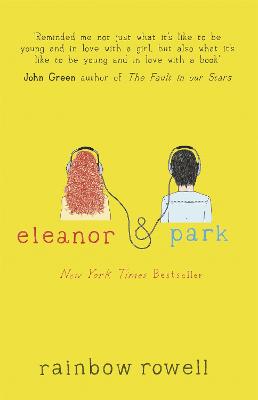Reviewed by girlinthepages on
Eleanor & Park was the last Rainbow Rowell book I had left to read. I had devoured and loved all of her other novels, yet Eleanor & Park was the most hyped of her works, and with hype always comes the potential for disappointment. I decided to take the plunge and read it after picking up a signed and special edition copy. I was 110% not disappointed by this book, as it met every expectation I had going in and brilliantly tackling topics I wasn’t even aware the book contained.
This book is at its core a romance, specifically a romance targeted to capture all of the intimate, awkward moments and emotions experienced in a first relationship. I remember my 14 year old self going through so many of the same emotions, from the thrill of the first kiss to the pressure to define yourself as in a relationship to your peers (made all the worse by social media, which Eleanor and Park thankfully didn’t have to worry about, as the book is set in 1986). Eleanor and Park are both flawed, socially self-conscious, and unsure of their feelings; they’re not instantly likeable characters, which I loved. So often protagonists are written to make readers want to be them or want to be best friends with them, as they’re incredibly perfect, smart, enviable, etc. Any protagonist can be perfect, but writing a nuanced and flawed protagonist is so much more difficult. I grew to learn and care about Eleanor and Park through their experiences and layers of their personality, not because they seemed “likeable.”
“Eleanor was right. She never looked nice. She looked like art, and art wasn’t supposed to look nice; it was supposed to make you feel something.”
Speaking of Eleanor and Park, most reviews I’ve read focus on how much they love seeing Eleanor as a YA main character because she’s not super skinny, popular, etc. I completely agree with that sentiment, but for me Park was the character who drew my attention, as he struck me as being less comfortable with himself than Eleanor, who has a quiet confidence about her (for example, she never has to justify to herself or anyone else why she dresses to differently). Eleanor’s inner dialogue is often geared to the external, as her focus and worries gravitate around her siblings, her mother, and her severely abusive and dysfunctional family life. Park, meanwhile, has a much more introverted inner dialogue, as he constantly questions that implications of his race and gender, and struggles to experiment with breaking gender norms through his appearance and battles the constant, if underlying, discrimination he faces due to his half Korean heritage.
Though the book is a romance, it tackled a lot of underlying issues with different systems of oppression, which I explore more in depth in this discussion post That being said, I appreciate that it doesn’t turn into an “issue” book, but rather themes such as abuse, racism, neglect and bullying are interwoven into the larger story without overtaking it. After all, victims of such systems of oppression must often carry on with life despite their circumstances, and it created an odd sort of pride in me as a reader to watch Eleanor fall in love and find someone who values her amidst the traumatizing, abusive, and sexually inappropriate behavior she suffers at the hands of her stepfather. Likewise, I appreciated seeing Park being able to grow as a person and as a boyfriend in a relationship where he wasn’t judged by how masculine he was or wasn’t, and where his race wasn’t a continuous point of difference (at one point, Eleanor admits she doesn’t really know what him being half-Korean “means,” because she doesn’t see him through the filter of race, but rather just as her boyfriend who she adores).
I feel that this book is incredibly important. Not only because it focuses on so many “tough” topics and includes quite a bit of diversity, but because it shows the ugly sides of high school, the tough parts of being a teenager and swimming the the social shark tank everyday, the dirty underbelly that goes on behind closed doors in the suburbs. It shows this ugliness so that it can show how people can cope with it and rise above it, and how ugly situations don’t have to define or mar the rest of your experiences in life. It doesn’t have to be the end of the world; it can be the catalyst to start a new one.
Overall: I loved this book, as usual, because Rowell writes such meaningful characters who’s stories lie in their experiences rather than in their strength of action. It may seem slow for readers who prefer more plot drive novels, but there are so many subtle layers to this book to examine and mentally engage with that I found it incredibly stimulating. My favorite part about this book is how flawed and awkward Eleanor and Park are, and how by the end of it you want the best for them anyways. The ending does get a bit ambiguous, and there are certainly answers I want that I don’t conclusively have, but it wouldn’t be realistic if everything was tied up with a bow. Rinabow Rowell has stolen my heart again with her writing, and I can confidently state that this is a book I will implore anyone and everyone I know who reads YA to experience.
Reading updates
- Started reading
- 15 January, 2015: Finished reading
- 15 January, 2015: Reviewed
